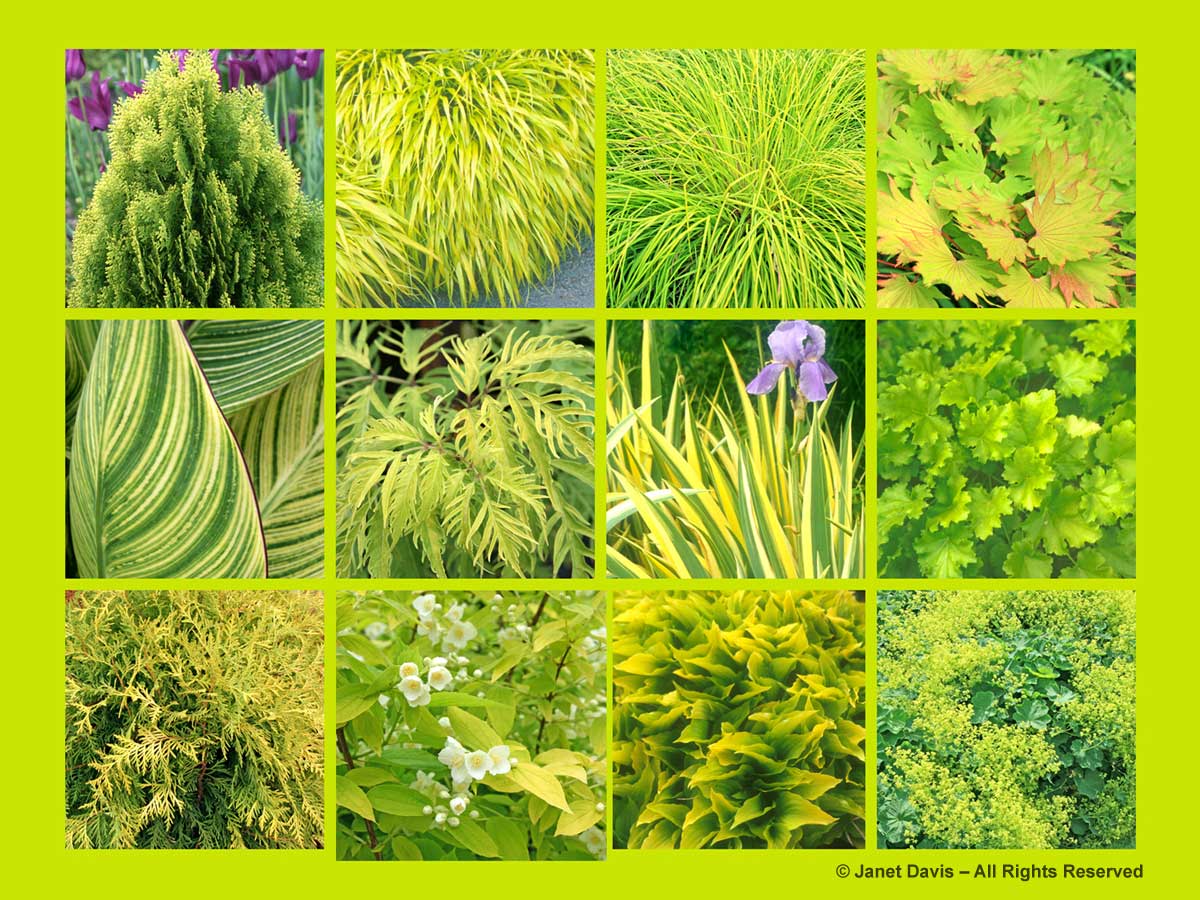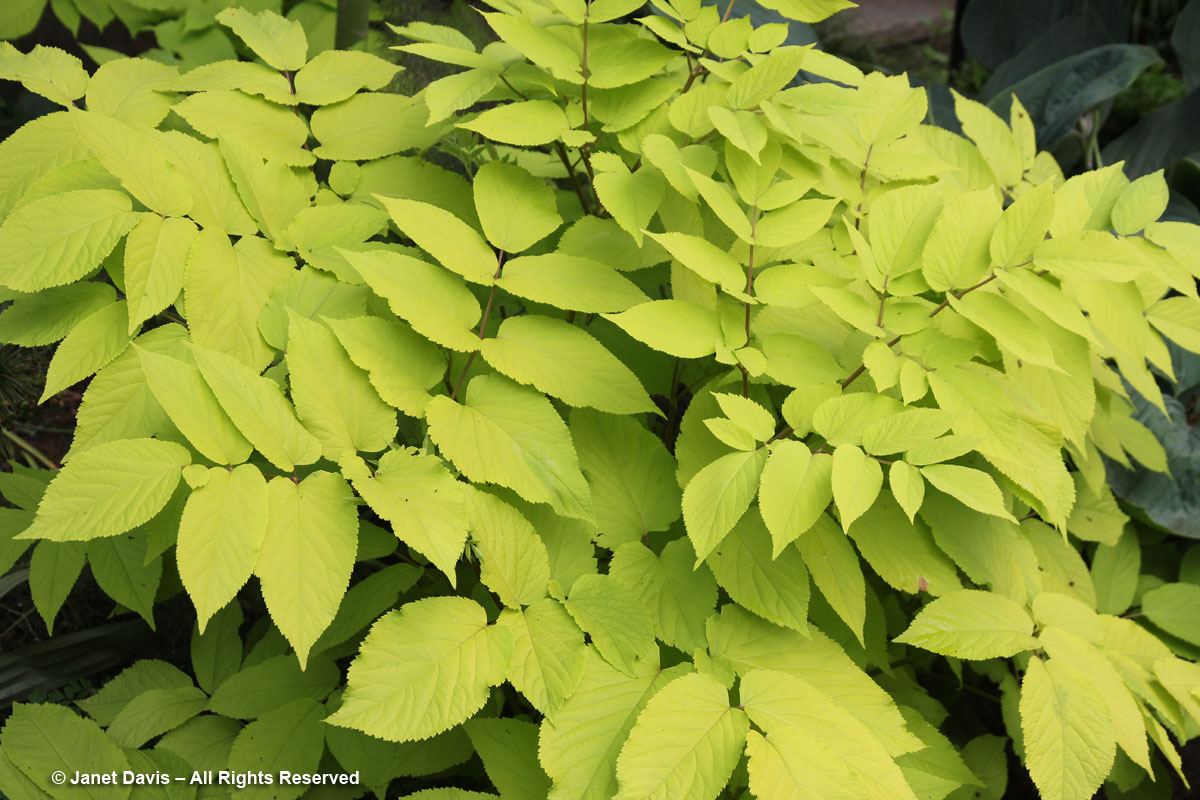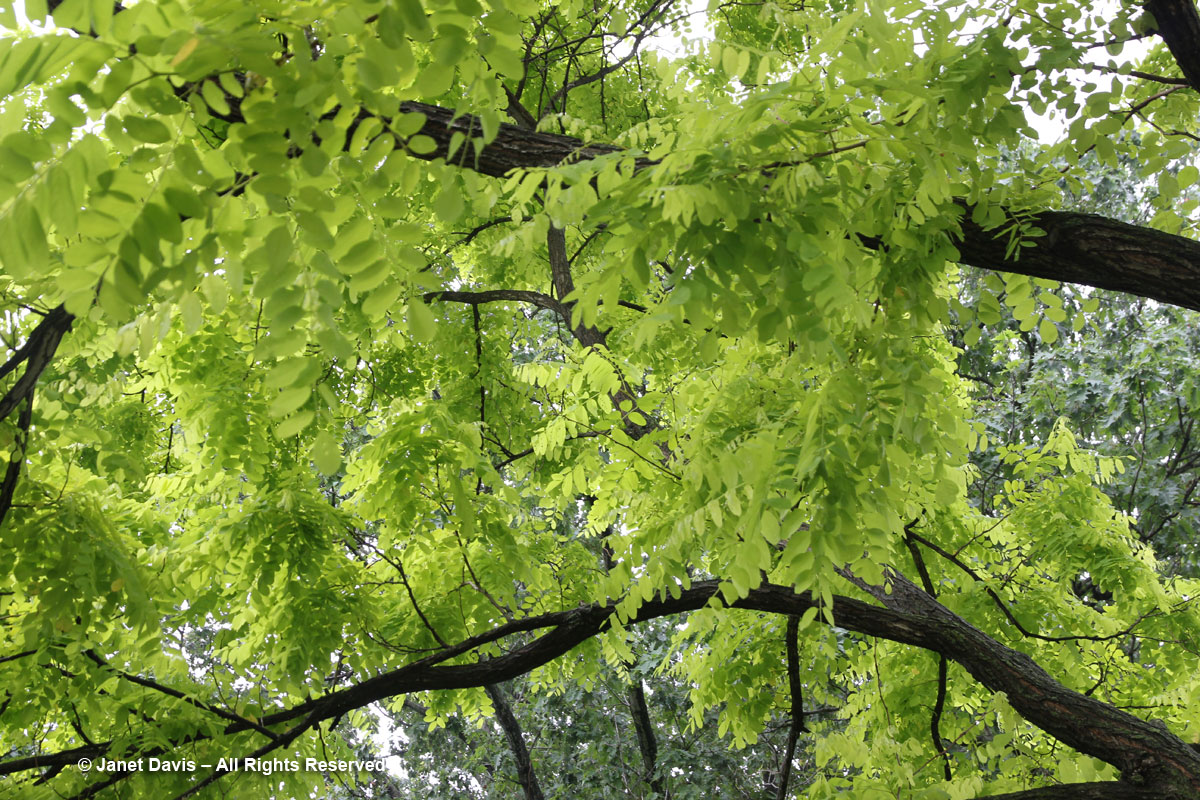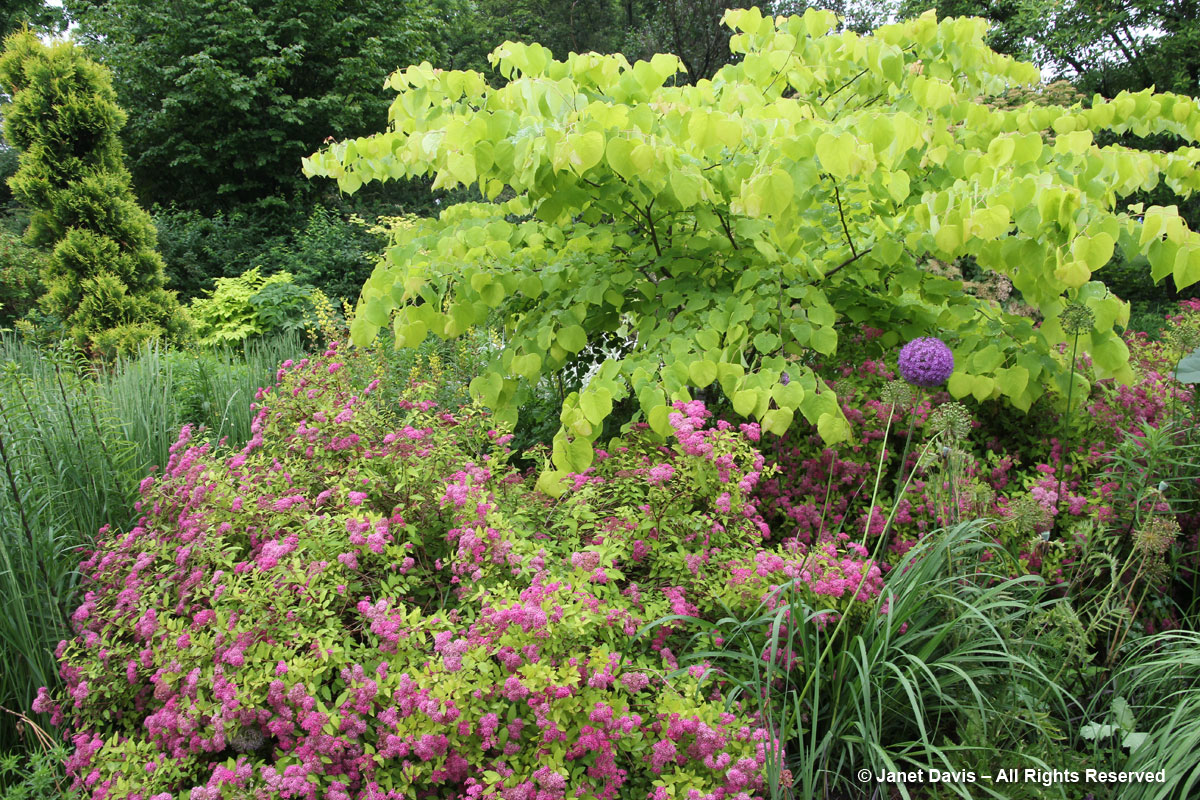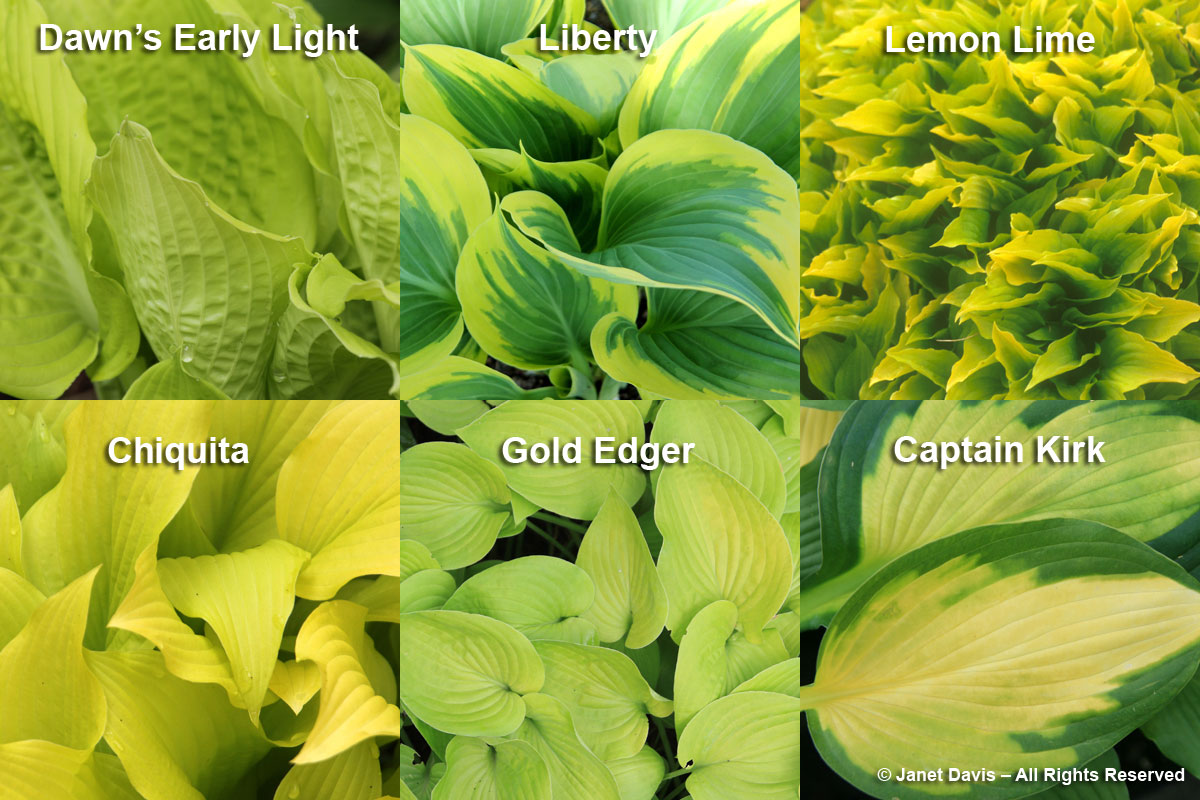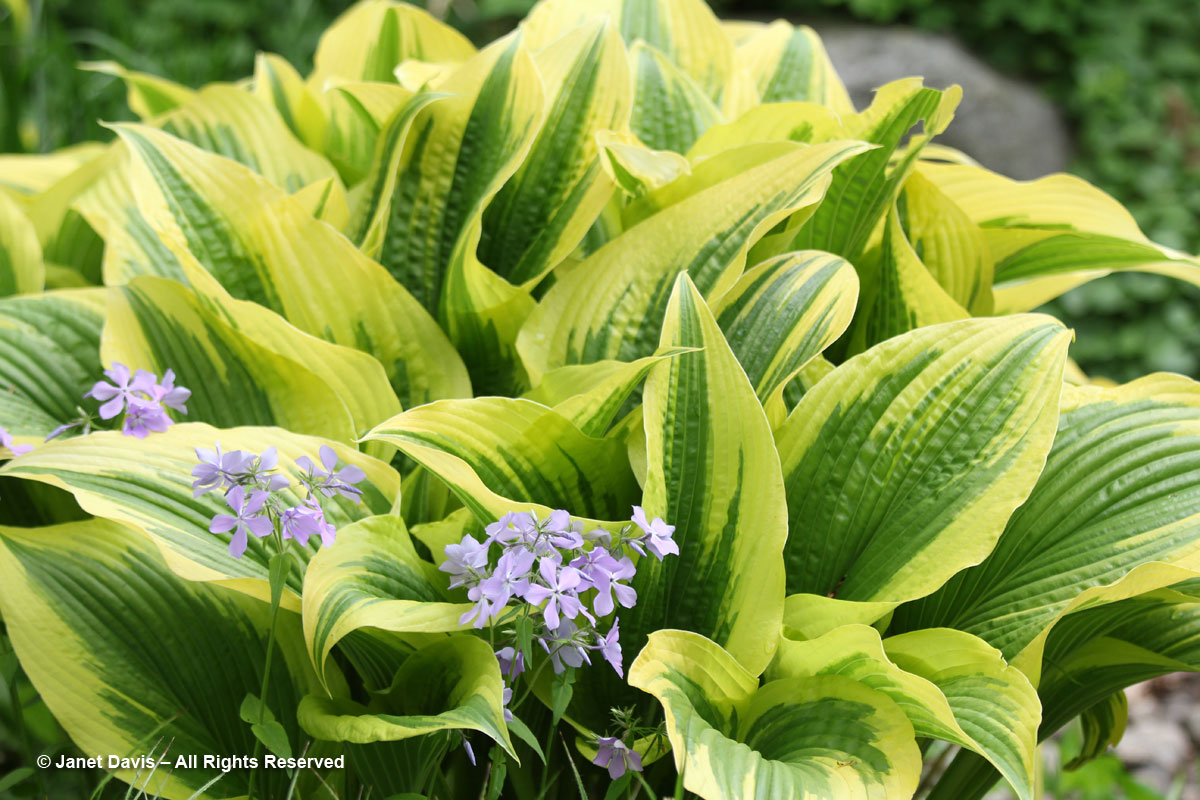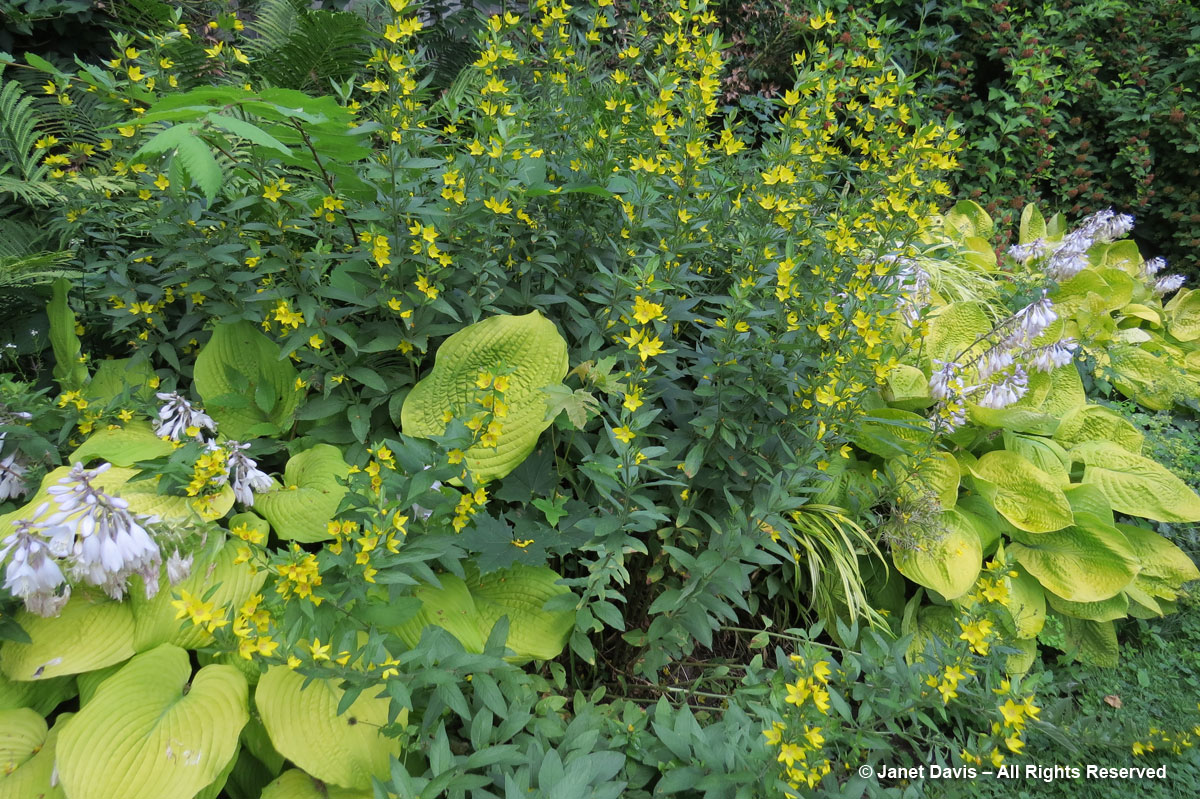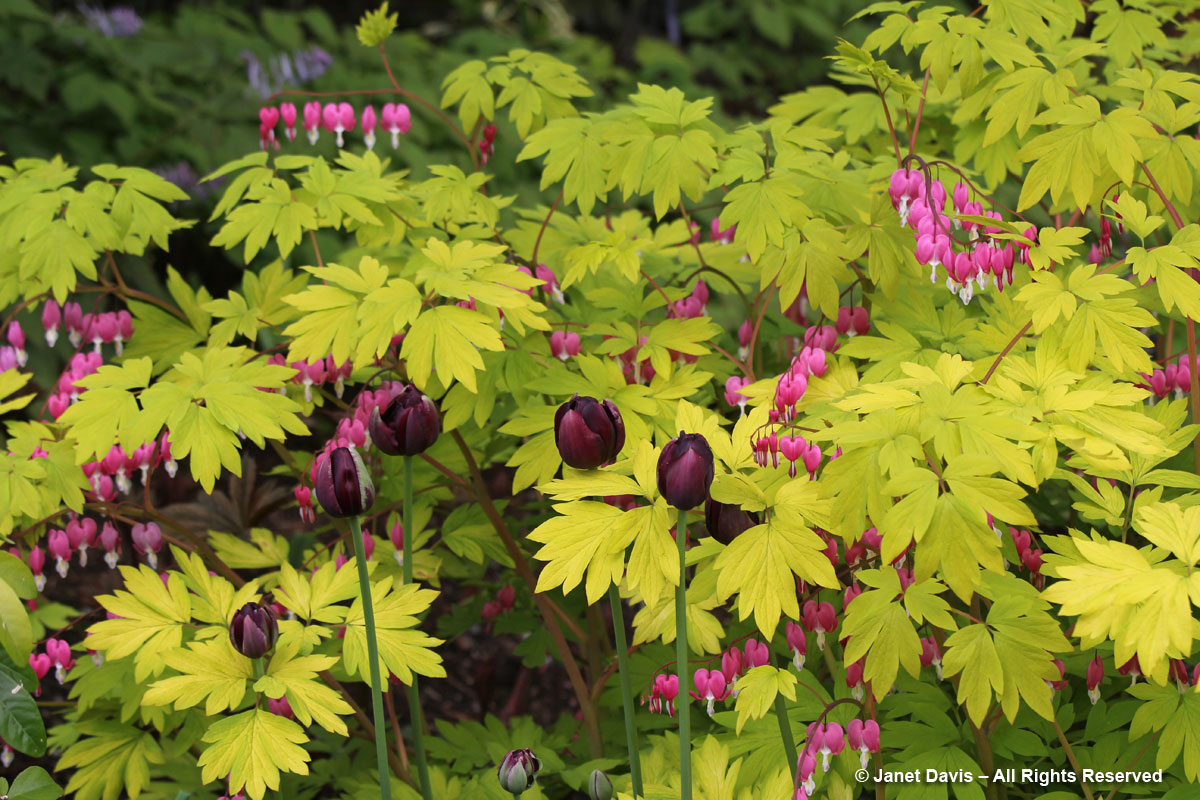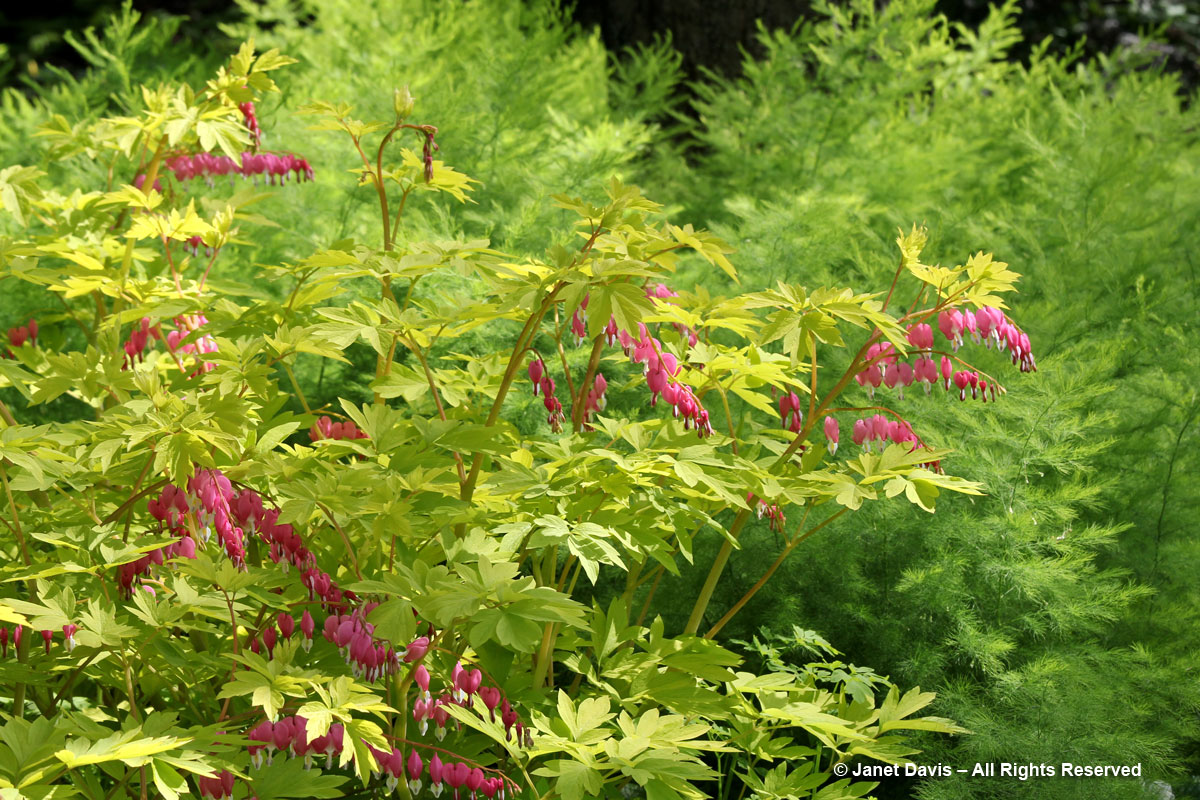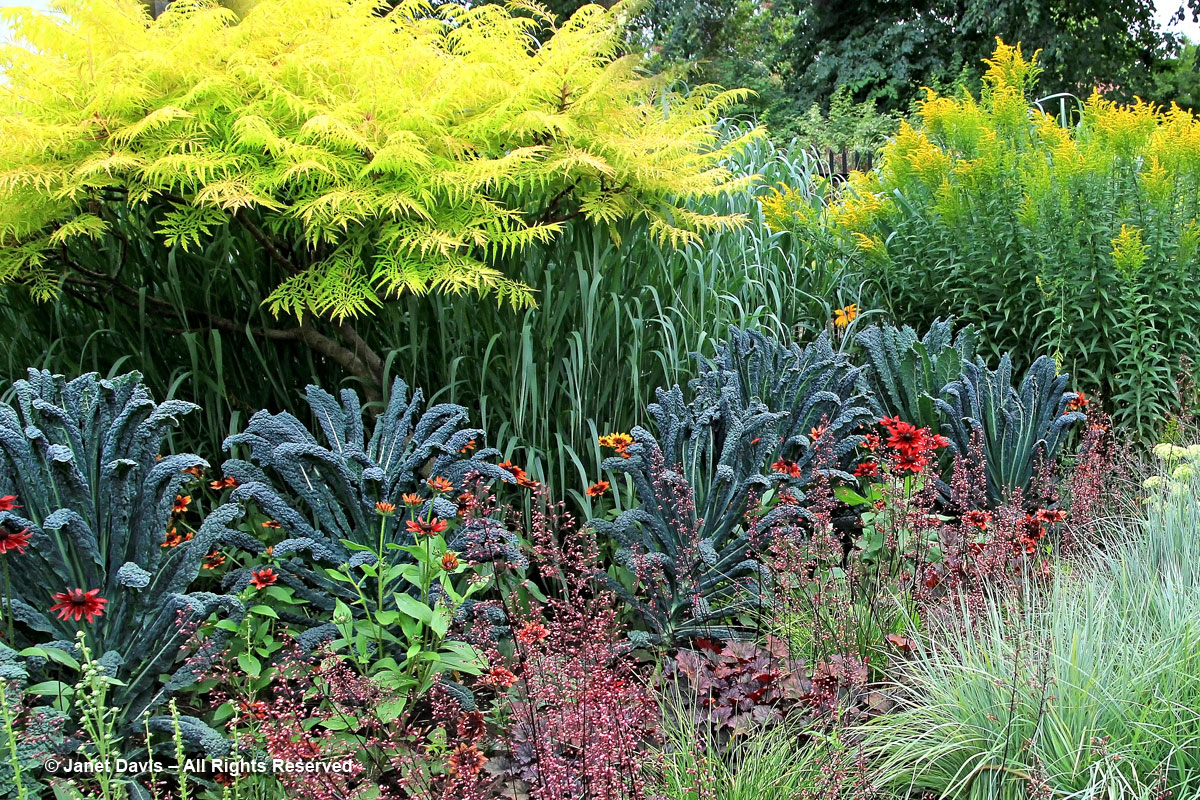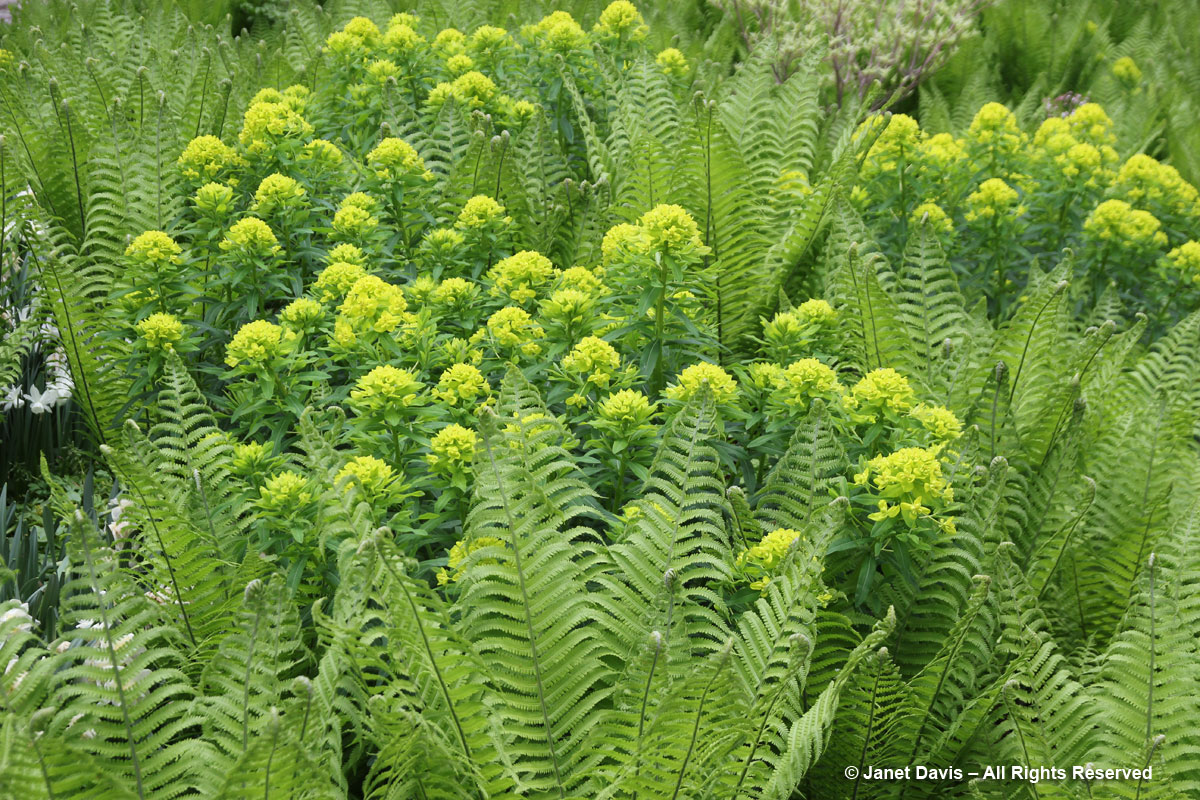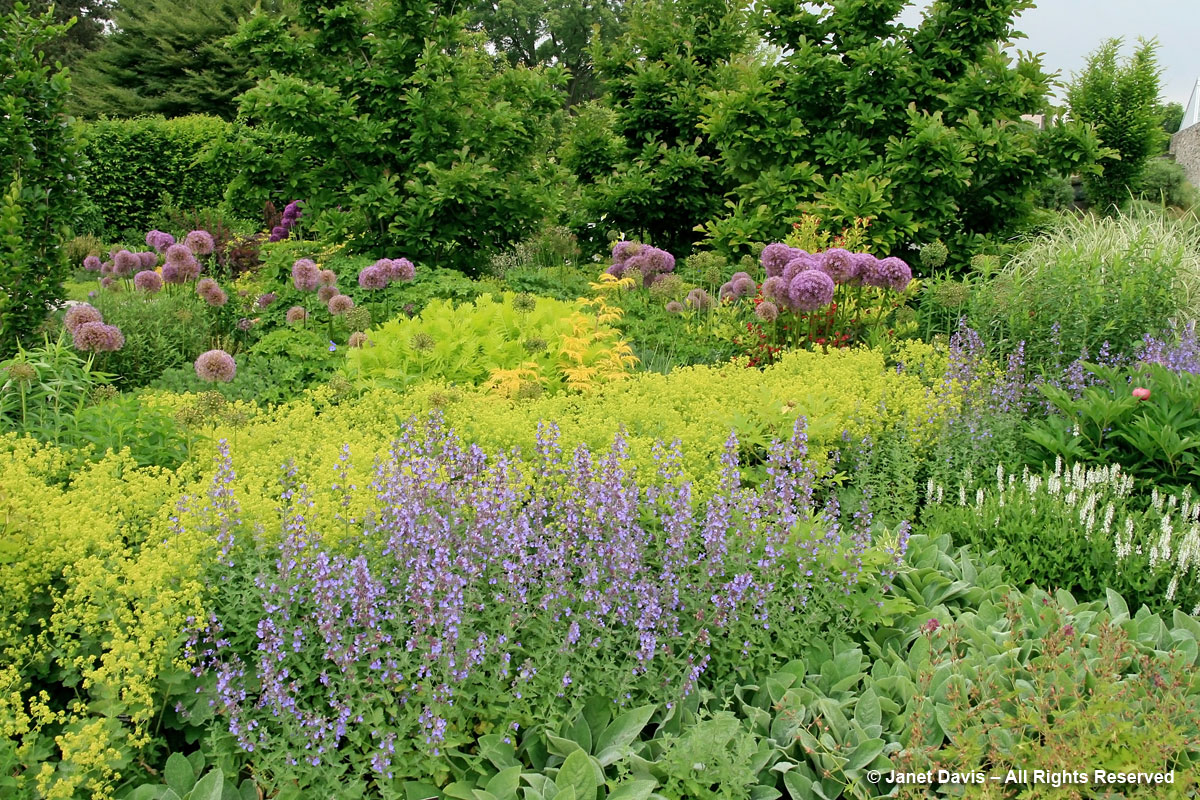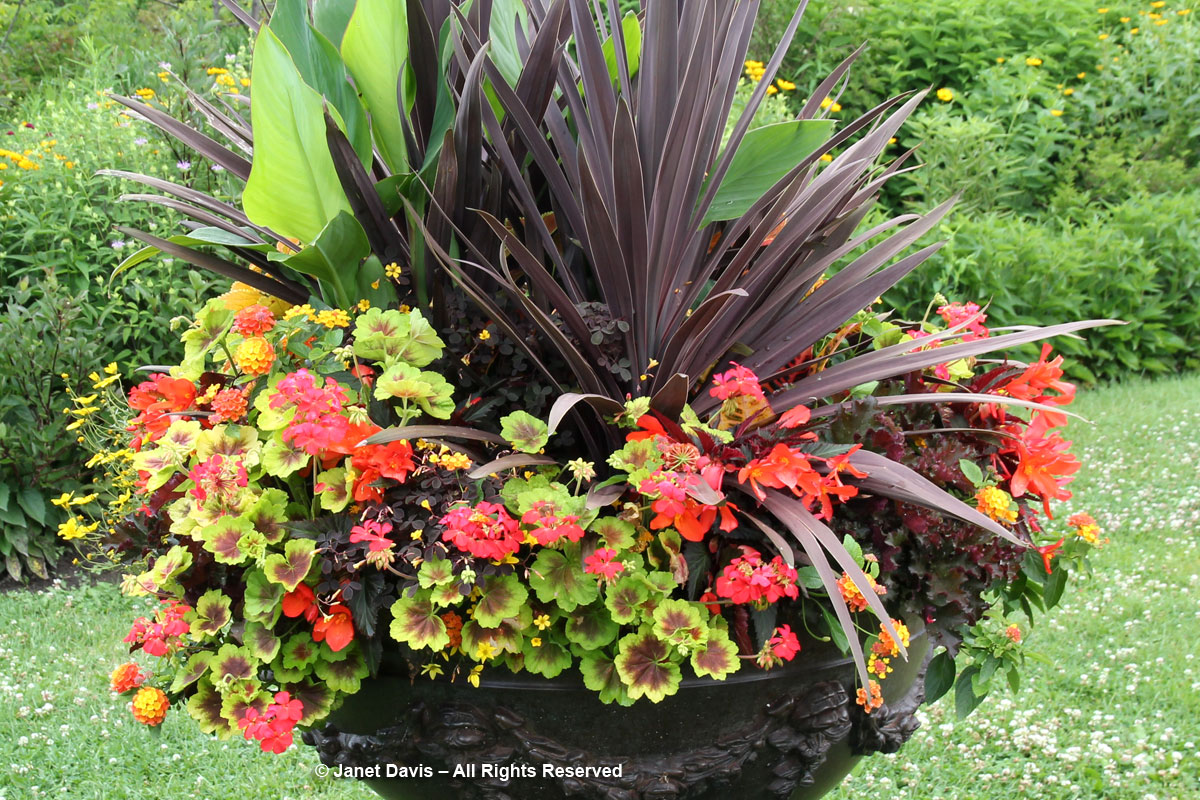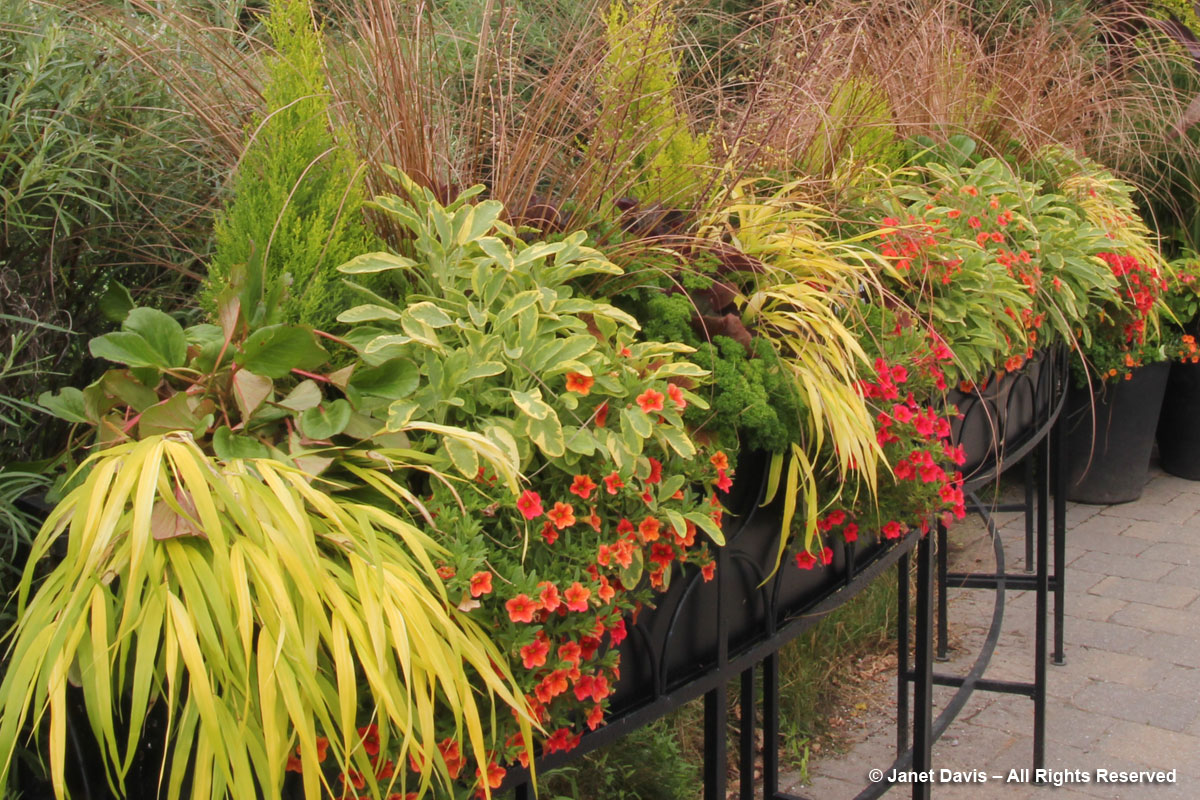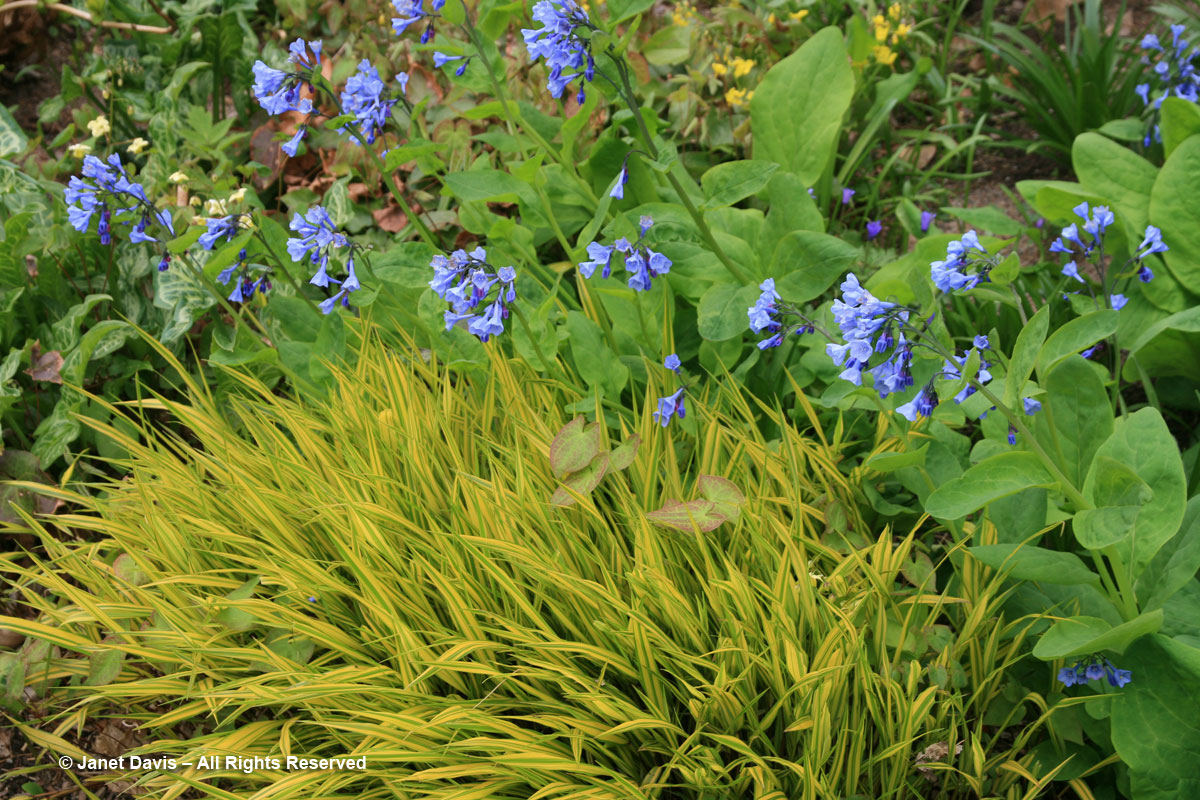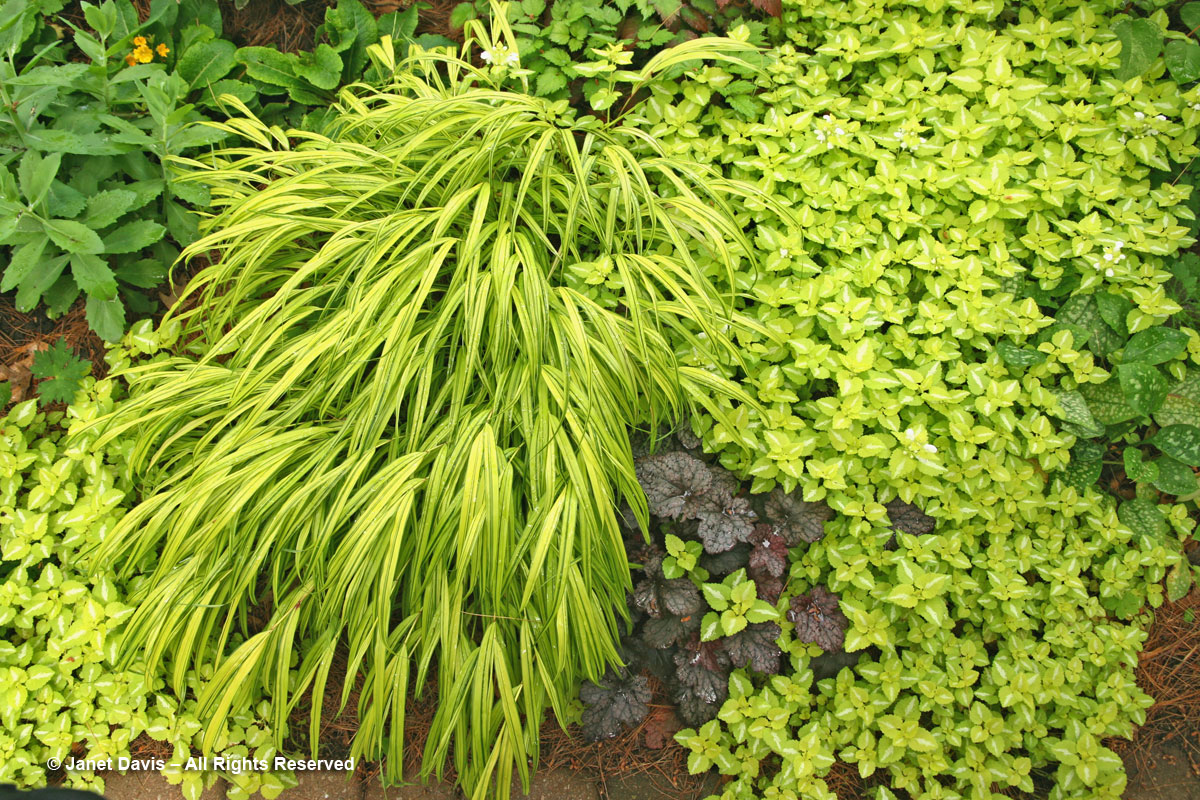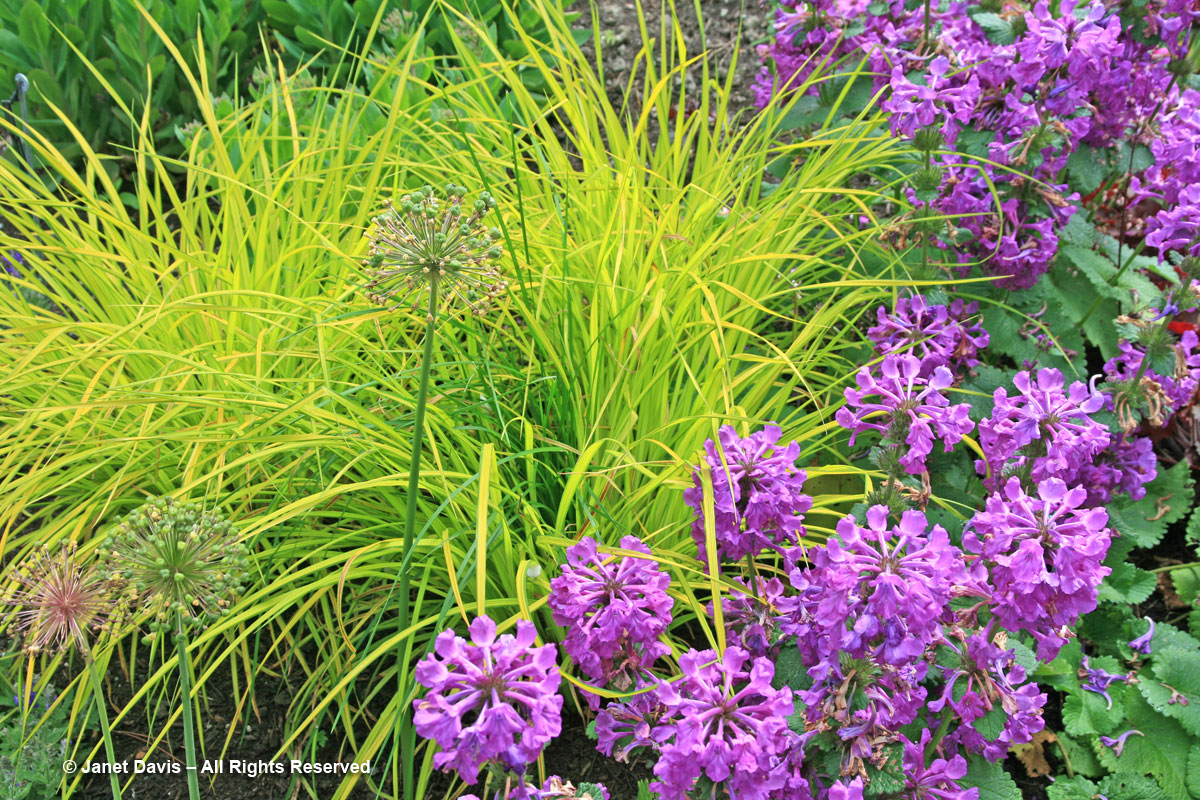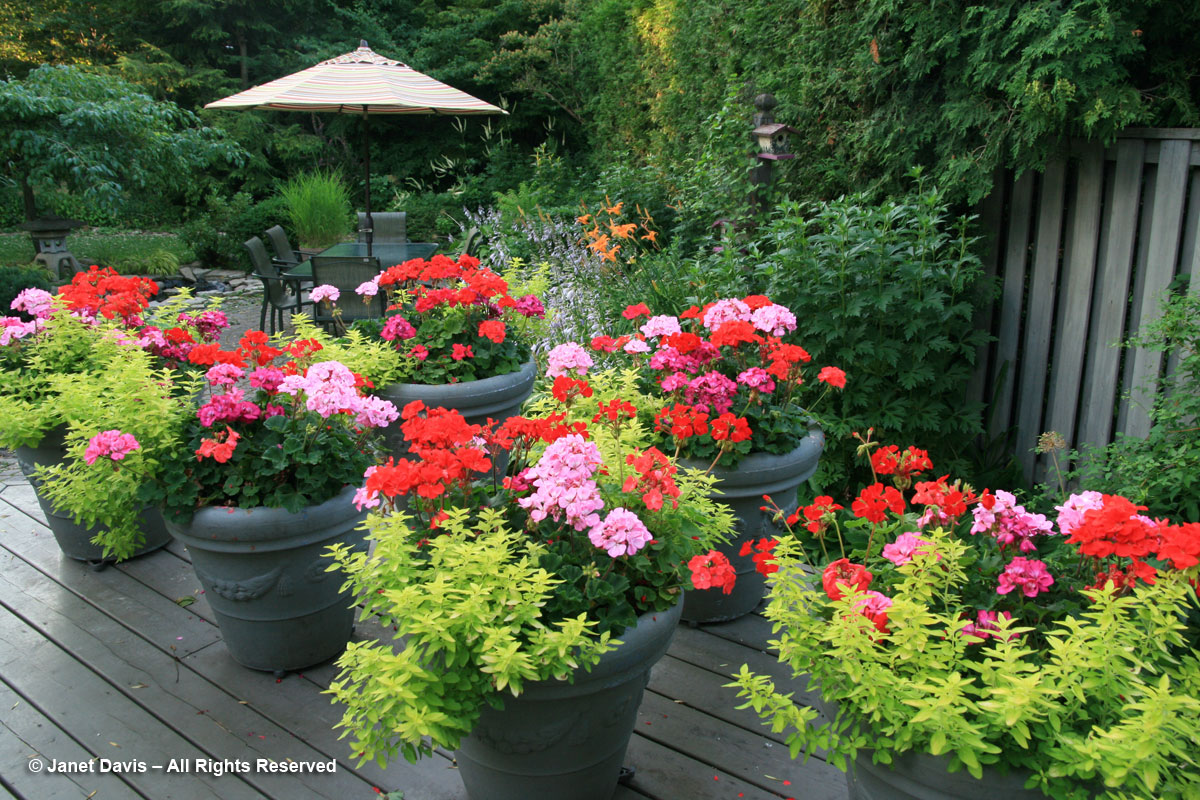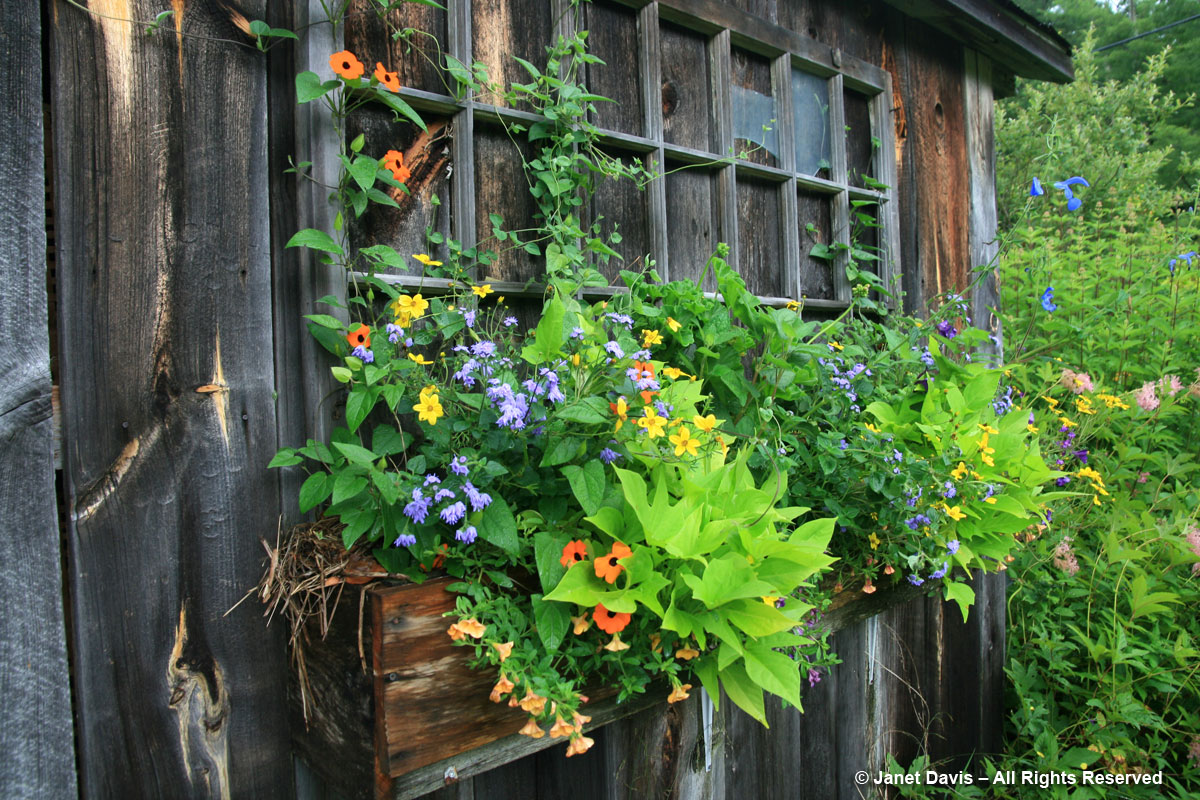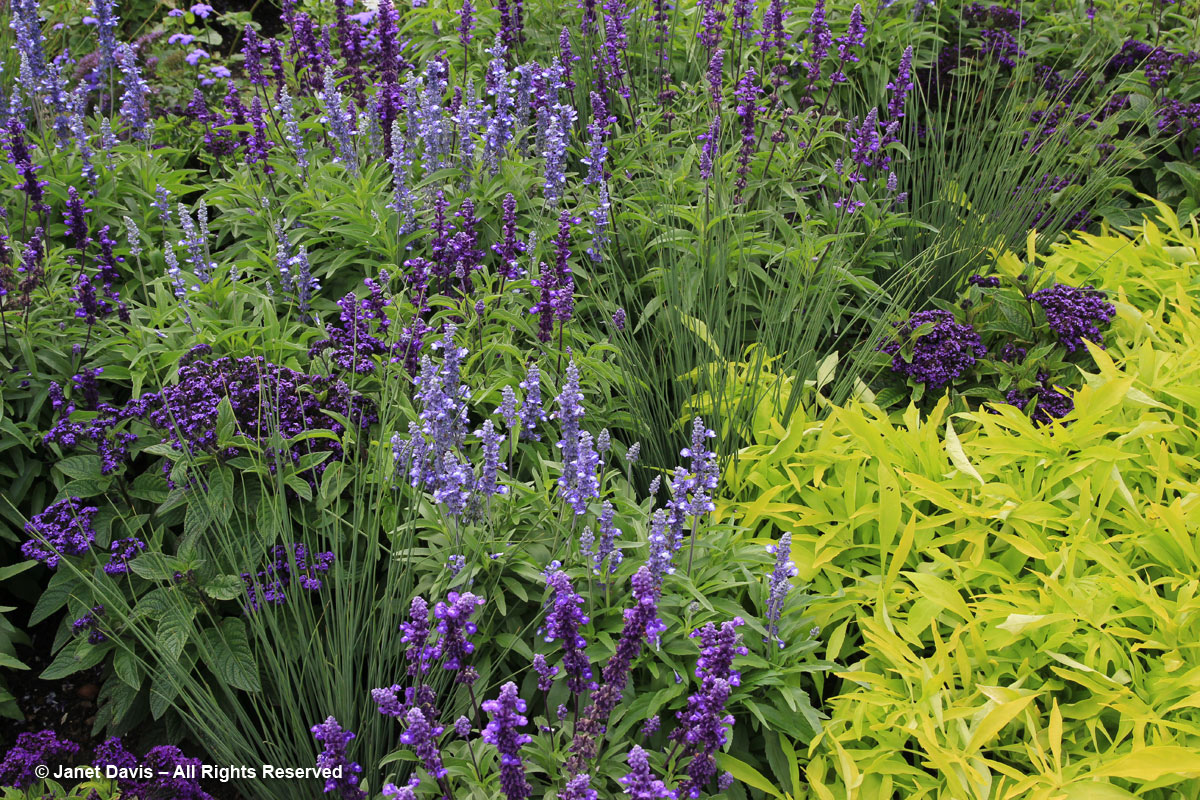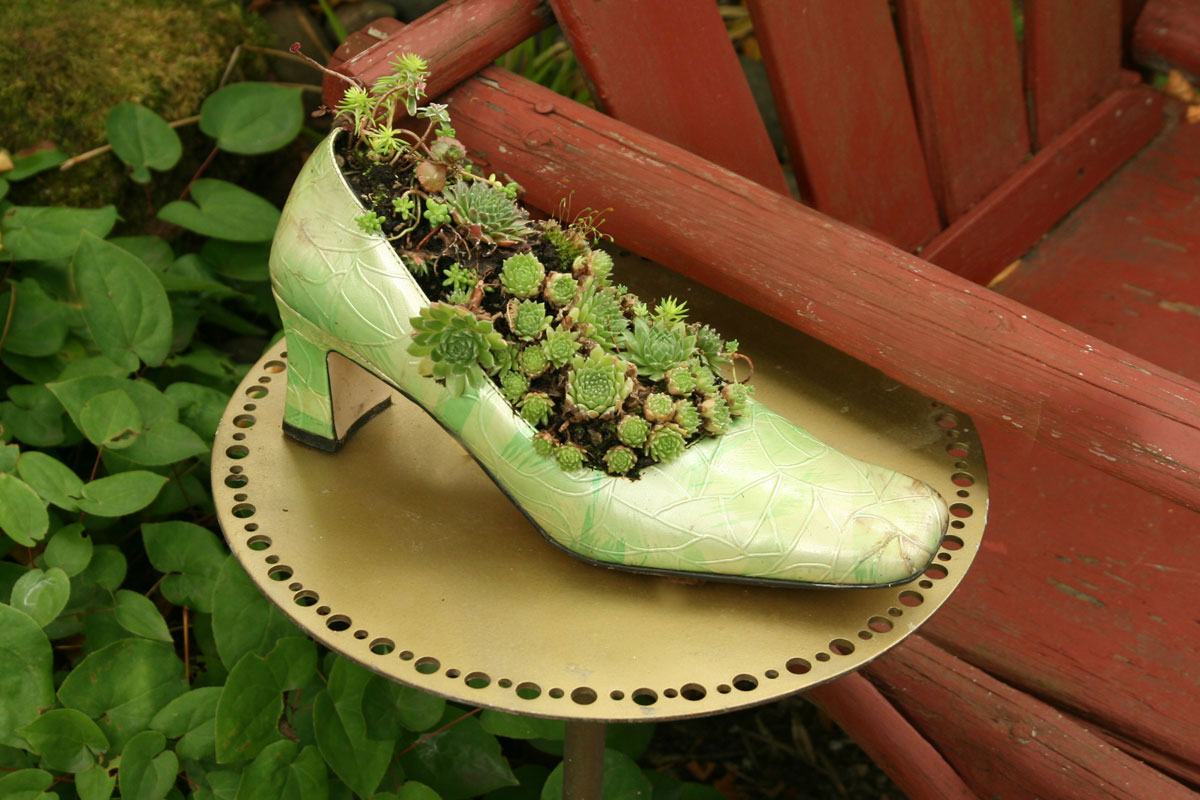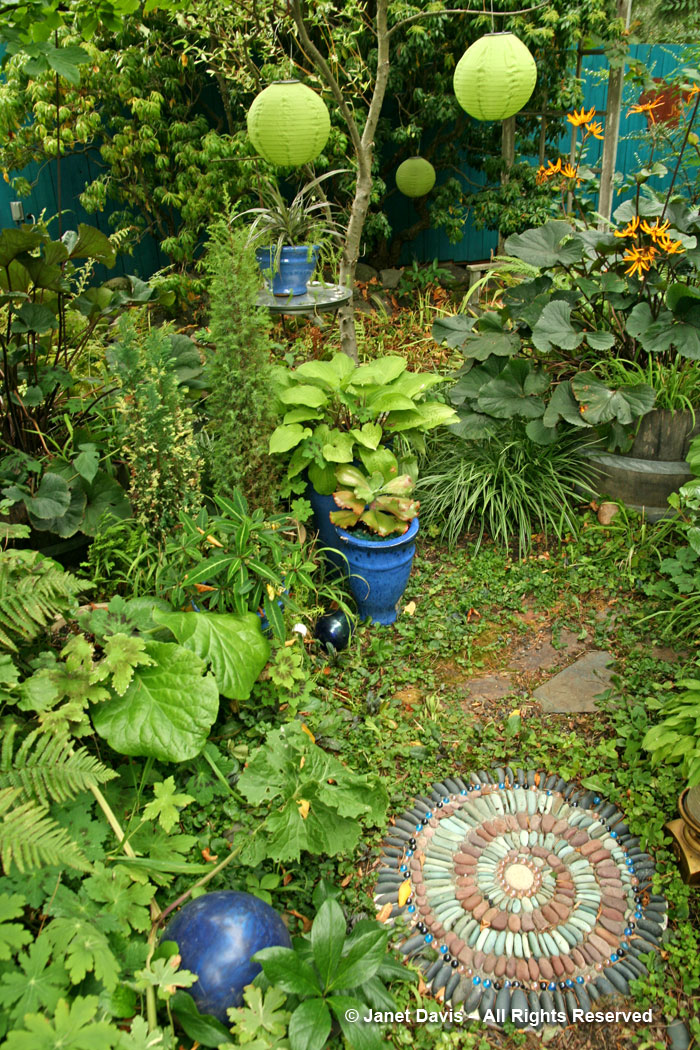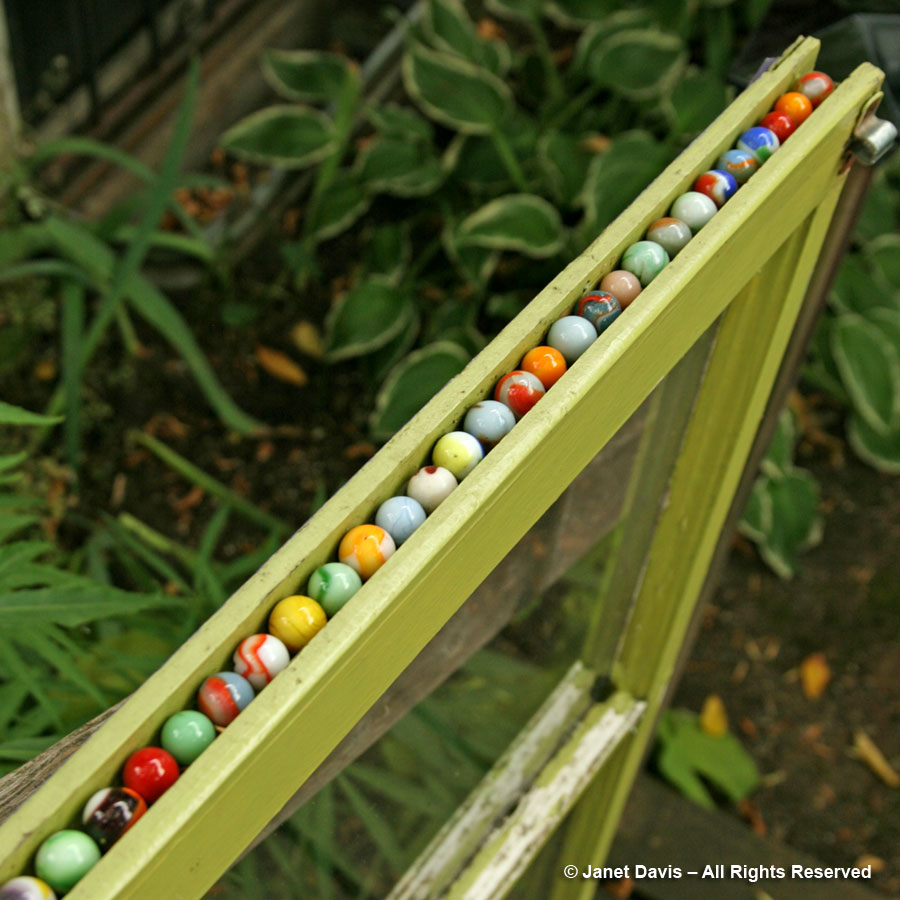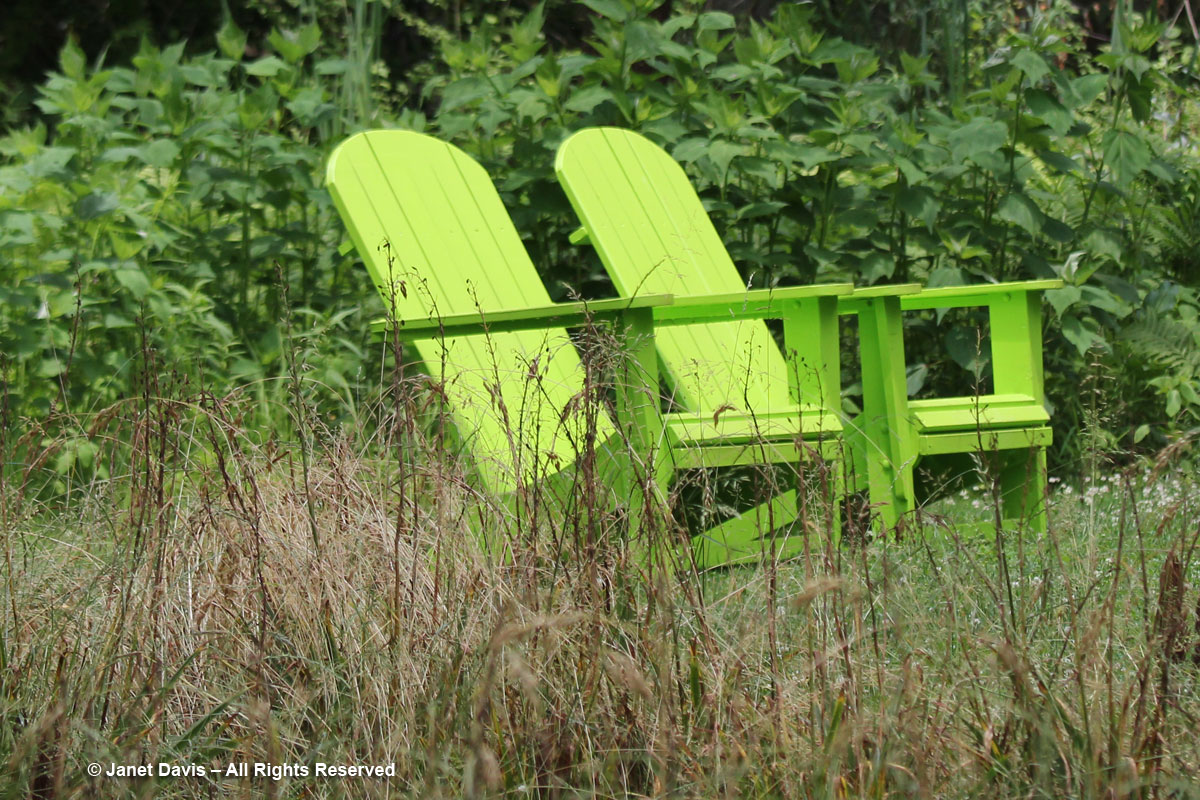When you mix green with yellow in equal portions, you get a mountain range in the southeast of France (Massif de la Chartreuse); the Carthusian Monks of the region, whose order was founded in 1084; “charterhouse”, the English translation of chartreuse (and the designation for the Carthusian monasteries which were chartered, or given financial support, by the Duke of Burgundy); and the cordial Green Chartreuse, brewed by said monks from distilled alcohol aged with approximately 130 flowers, plants and herbs featuring cinnamon, mace, lemon balm, dried hyssop flower tops, peppermint, thyme, costmary, arnica flowers and angelica roots, among many other ingredients. The eponymous colour of that liqueur, said to be the “elixir of life” when its recipe was granted to the monks in a 1605 manuscript, is the luminous colour I want to blog about today.
Charteuse, lime, golden-green, khaki…. In reality, there is a broad range of yellowed greens and a broad range of foliage plants that fit the description. But when that dollop of yellow is added to the green (well, when the plant rejects certain yellow light waves along with the green ones, as it powers photosynthesis), it results in a plant that will add a pool of shimmering light to the garden, especially to shady corners. Perhaps it’s a perennial like Aralia cordata ‘Sun King’, below.
Or a tree like the ‘Frisia’ black locust (Robinia pseudoacacia), where it’s hardy.
Or perhaps a shrub like the beautiful Japanese spirea ‘Ogon’ (Spiraea thunbergii), below, at Chanticleer Garden in Wayne, Pennsylvania.
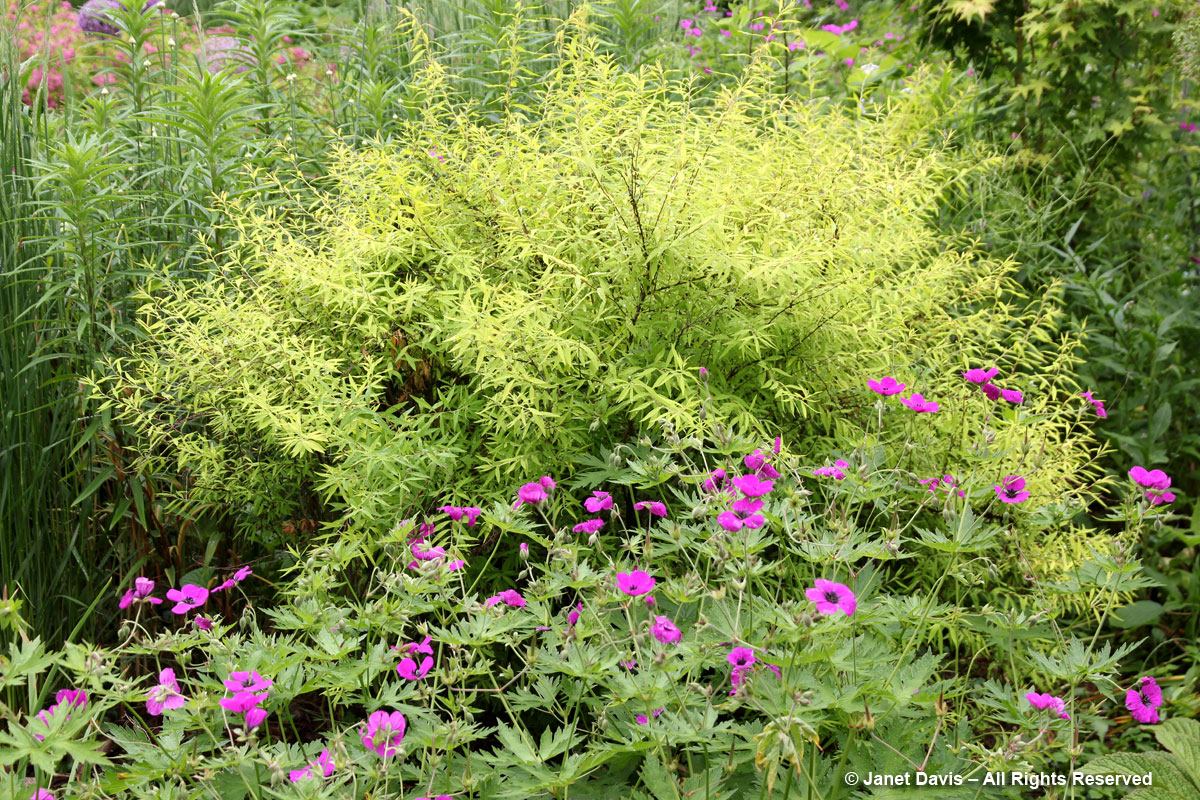 It might be the delightful ‘Hearts of Gold’ redbud tree (Cercis canadensis), below, also at Chanticleer (and kept ‘stooled’ or pruned to the ground each spring to promote bright new growth). In front of it is another excellent chartreuse-leafed shrub, Magic Carpet spirea, (Spiraea japonica ‘Walbuma’) with its cerise-pink flowers.
It might be the delightful ‘Hearts of Gold’ redbud tree (Cercis canadensis), below, also at Chanticleer (and kept ‘stooled’ or pruned to the ground each spring to promote bright new growth). In front of it is another excellent chartreuse-leafed shrub, Magic Carpet spirea, (Spiraea japonica ‘Walbuma’) with its cerise-pink flowers.
Then there’s the lovely, old-fashioned perennial Filipendula ulmaria ‘Aurea’, shown below in a border at Chanticleer’s Tennis Garden.
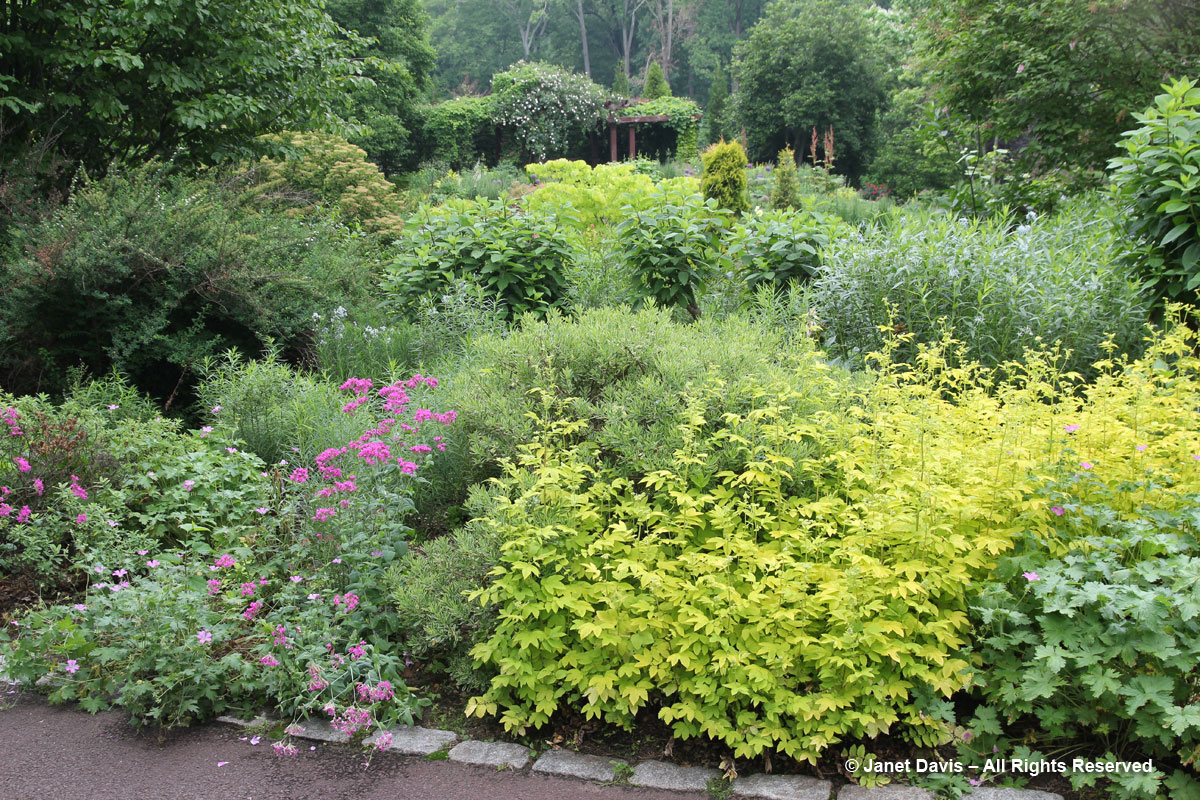 It’s easy to use perennials to add that shot of lime punch, especially if you select from the huge roster of hostas that fit the bill. Here are just a few ideas.
It’s easy to use perennials to add that shot of lime punch, especially if you select from the huge roster of hostas that fit the bill. Here are just a few ideas.
I was wowed by the sumptuous, big Hosta montana ‘Aureo-Marginata’ in the Montreal Botanical Garden’s fabulous shade garden. Here it is with Phlox divaricata keeping it company.
And in my own garden, a trio of big ‘Zounds’ hostas lights up an east-facing border, along with old-fashioned yellow loosestrife (Lysimachia punctata).
Another workhouse chartreuse perennial is the bleeding heart Lamprocapnos spectabilis ‘Gold Heart’ (formerly Dicentra). Here it is in bloom at VanDusen Botanical Garden in Vancouver with the dark-red tulip ‘Queen of Night’. What a gorgeous combo!
And here it is in the Shade Garden at Montreal Botanical with the feathery (and unusual) annual Asparagus tenuifolius. Talk about a hit of sunshine.
One of my favourite new shrubs is the Tiger Eye sumac (Rhus typhina ‘Bailmer’). I grow it in my own garden and love its chartreuse leaves in summer, that turn a delicious apricot-orange in autumn. But I adored this border at Montreal Botanical Garden, where it served as a brilliant backdrop for a sensuous ensemble of plants, including goldenrod, Tuscan kale, heuchera, little bluestem grass and ‘Cherry Brandy’ rudbeckias.
Euphorbias, anyone? Chartreuse needn’t just be leaves, either. This was a simple but striking spring pairing under trees at Montreal Botanical Garden: ostrich ferns (Matteucia struthiopteris) with marsh spurge (Euphorbia palustris).
A massed planting of lady’s mantle (Alchemilla mollis) in flower offers a spectacular lime punch, especially when paired with other June beauties like the alliums and catmint (Nepeta racemosa) co-starring here at the Toronto Botanical Garden. And note that drift of ‘Isla Gold’ tansy (Tanacetum vulgare) behind the lady’s mantle, another stellar chartreuse plant.
Speaking of the Toronto Botanical Garden, every year I enjoy the way annual plants are used in fabulous container arrangements (by the uber-talented Paul Zammit). That was especially true of this big, tropical-themed urn, with its frilly, variegated ‘Indian Dunes’ pelargoniums. Look how perfectly those wine-red markings in the leaves echo the spiky ‘Red Star’ cordyline in the centre.
I also loved this line of window boxes at the Toronto Botanical Garden, with their repeated use of the Japanese forest grass ‘All Gold’ (Hakonechloa macra), punctuated by the tender ‘Goldcrest’ Monterey cypresses (Cupressus macrocarpa) behind.
The more common Hakonechloa macra ‘Aureola’, shown with Virginia bluebells (Mertensia virginica) below, is no slouch in the looks department either.
And what about this delightful, chartreuse double-bill in Shari Ezyk’s Etobicoke, Ontario garden? Hakonechloa macra ‘Aureola’ with Lamium maculatum ‘Beedham’s White’.
Another chartreuse grass I adore is Bowles’ Golden Sedge (Carex elata ‘Aurea’). Here it is at VanDusen Botanical Garden with Stachys macrantha ‘Superba’.
There are many chartreuse annuals that will add oomph to a border or container. In my own garden, I’ve tried several over the years in my deck pots, like this golden oregano (Origanum vulgare ‘Aureum’) accenting orange, pink and red geraniums.
In Marnie Wright’s Bracebridge, Ontario country garden, the popular ‘Margarita’ sweet potato vine (Ipomoea batatas) looks particularly charming in a rustic windowbox. I love the way it pairs with the orange blackeyed susan vine (Thunbergia alata).
Another sweet potato vine that acts as a good foil is Ipomoea batatas ‘Illusion Emerald Lace’, shown below with blue and purple salvias at the Montreal Botanical Garden.
Apart from plants, of course, there are myriad ways to add a splash of chartreuse via furnishings, stains and paints, and funky little accents. No one does ‘funky colour’ better than Portland’s Nancy Goldman. Here she shows just how creative you can get with an old pair of party pumps. I love this idea.
Nancy’s garden has a fun party vibe, especially with the paper lanterns that go perfectly with that lime-green hosta below. And how cool paired with the blues.
You’re not always sure what you’re seeing in Nancy’s garden, so I’m not sure if this chartreuse rail really was meant to be a home for marbles. But it’s an eye-catcher!
After all this garden touring, let’s finish up by taking a rest in a pair of comfy chartreuse garden chairs nestled in the long grasses in Chanticleer’s Bell’s Run Woods. Time to put our feet up — and maybe try a sip of that flowery cordial crafted by those French monks. Bottoms up!

